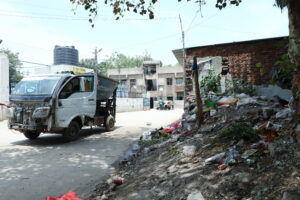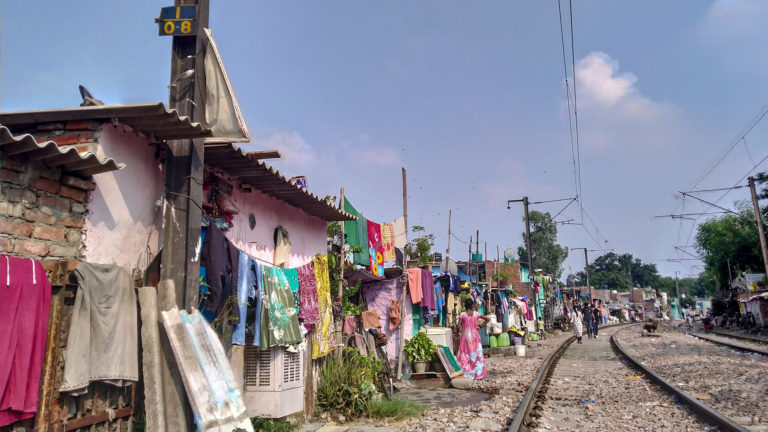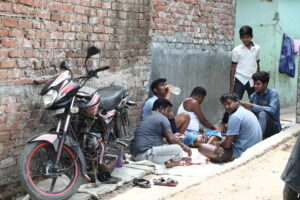Glaring vaccine inequity in Delhi slums
Raja, 30, migrated recently to Delhi from his native place in Tamil Nadu in search of work. He was glad as he quickly managed to get a job as a construction worker. However, with the lockdown that the Delhi government announced almost a month ago, Raja lost his job as rapidly as he had found it.
Raja now regrets his decision to migrate to Delhi. He says that he moved to the city in search of a better life for his family of three, his wife and a three-year-old daughter, but now he has no income. Living in a slum in Jal Vihar in south Delhi, just beside the railway tracks, he says that he can’t provide a secure and safe environment for his daughter and hence he will move back to his native village in Tamil Nadu.
“I came here hoping my life will be better but it turned out to be just the opposite. I am scared to go out because of the coronavirus pandemic. What if anything happens to my daughter? The government doesn’t think about us. Even the place we stay is not clean and safe,” says Raja, who hails from Villupuram, about 170 km south of Chennai.
Raja, who does not speak or understand Hindi, has no idea about how to get Covid-19 vaccination. Asked whether he had registered himself on CoWin app for the vaccination, he is clueless. “Do we have to register online to get the vaccination?” he asks? “I don’t have a smartphone, so I don’t have much idea about it,” he adds.
Kumar, who works as a security guard in the city is more aware and forthright, both about his rights as a citizen and the duties of the government that he blames for ignoring the slum dwellers in its vaccination drive. “We live in such a poor country where the government cannot even provide adequate healthcare facilities to its own citizens and a country that cannot even provide this basic right should not be considered a developing country,” says Kumar.
“Most of the people here have not been vaccinated. They did not even have any check-up during Covid-19. The government should set up a camp here where everyone can get vaccinated. Most of the people are illiterate, they don’t even the how to book for vaccination, everything is online. Most of them don’t even have smartphones for doing the registration,” he says.
The fortunate few
While a large majority of people are helplessly waiting for government assistance in vaccination, a handful have managed to get themselves registered and even vaccinated, thanks to their employers, who help them register and follow through right up to the point of getting them vaccinated.
“I work in Delhi Golf Club as a peon. My manager asked me to get vaccinated and then join work. However, I could not do it as I didn’t know how to book for the slot. Then my manager helped not only me, but also my wife, children, two sisters and my mother in getting the first dose of the vaccination,” says 27-year-old Krishna. “If someone can help people living in the slums to get vaccinated, it will be so useful,” he adds.
Another person says that his daughter studying in Class 11, registered both for him and his wife to get the vaccination last week. “I don’t know much about this, my daughter told us to get vaccinated and she registered for us. We stood in the queue for three hours at Jeevan Hospital and finally we got vaccinated. Some youngsters know how to register, they can help those who are not aware of it. Most of them are not educated, do not have access to technology, and don’t know how to register on the CoWIN app,” says 38-year-old Murugasen, who is an auto driver.
Luxuries of social distancing
Raja is not alone in the struggle. In the slum where he stays, which is also known as the Madrasi Camp, as it is home to more than 1,000 Tamil families, there are many like him who are struggling with basic hygiene issues and any form of medical care. The people here say that social distancing is a luxury for them that they cannot afford.
“Social distancing is something the families cannot even dream about. Everyone lives in a small room. We are a family of nine and we all live in a one room. We can only maintain social distancing when we are outside. But that is also not easy as our houses are very close to each other,” says Ram, a 50-year-old resident of the slum, who was employed as a cleaner in a hotel nearby.
He blames the government for not preparing for the second wave, for which people like him are left with no jobs and no income. “I have seven kids, and two are studying while the other five are working. But now because of the pandemic my kids don’t have jobs and as a result we have zero income. It is the government’s fault that they were not ready for the second wave of Covid-19, and now people like us are suffering,” he adds.
The major problems that people face while living in slums, and not just here at Madrasi Camp, are lack of basic civic facilities like sanitation, street lights, congestion, proper garbage disposal and many other things. In 2010, Delhi Urban Shelter Improvement Board estimated the number of slum in the city to be around 675, which served as home to over 400,000 families, accounting for a total population of 20 million.

Irregular garbage collection during the pandemic makes the residents of slums vulnerable to many other diseases (MIG photos/E. Prema)
Woes of women
The problem is worse for women in the slums during the lockdown. Many of them say that their husbands just sit at home and drink alcohol all day, making life even more difficult for the family. “My husband is a tippler and he does not earn anything at all, leaving us to find work and get some money. My son, who failed in the 10th grade, now goes to clean cars, while I work as a domestic maid in several homes. Whatever money we make goes to run the household. And since my husband does not go to work and drinks daily, half my salary goes in his drinking. This has led to doubling our expenses, keeping us poor all the time,” says Usha.
Usha, unfortunately, is not an isolated case here. There many like Usha in the Madrasi Camp who face the same problem due to the lockdown.
The women say that another problem that they have faced during the pandemic is to keep the area clean. They say that since the garbage van does not come to collect the garbage on a regular basis, it leads to a large number of heaps of garbage in the area which exposes them to several other diseases.
The slum dwellers hope that sooner than later the government will look at the huge problem of vaccine inequity and address the issue urgently in order to keep not just the residents of the slums safe, but also the entire city.











